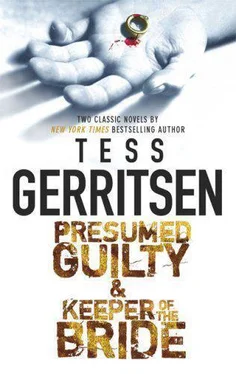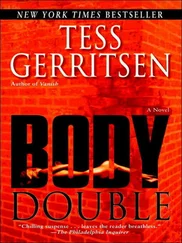1 ...7 8 9 11 12 13 ...54 Tibbetts rose to his feet and went over to the veranda railing. “What about her?”
“You know that hundred thousand bail they set?”
“Yeah.”
“Well, someone paid it.”
“What?”
“Someone’s paid it. We just got the order to release her.”
There was a long silence on the veranda. Then, in a low voice laced with venom, Evelyn said, “ Who paid it?”
“Dunno,” said Ellis. “Court says it was anonymous. Came through some Boston lawyer. So what do we do, huh, Lorne?”
Tibbetts let out a deep breath. He rubbed his neck, shifted his weight back and forth a few times. Then he said, “I’m sorry, Evelyn.”
“Lorne, you can’t do this!” she cried.
“I don’t have a choice.” He turned back to the other cop. “You got the court order, Ellis. Let her walk.”
“I don’t understand,” said Miranda, staring in bewilderment at her attorney. “Who would do this for me?”
“A friend, obviously,” was Randall Pelham’s dry response. “A very good friend.”
“But I don’t have any friends with that kind of money. No one with a hundred thousand to spare.”
“Well, someone’s putting up the bail. My advice is, don’t look a gift horse in the mouth.”
“If I just knew who it was—”
“It’s been handled through some Boston attorney who says his client wishes to stay anonymous.”
“Why?”
“Maybe the donor’s embarrassed.”
To be helping a murderess, she thought.
“It’s his — or her — right to remain anonymous. I say, take it. The alternative is to stay in jail. Not exactly the most comfortable spot to be in.”
She let out a deep breath. “No, it isn’t.” In fact, it had been horribly bleak in that cell. She’d spent the past week staring at the window, longing for the simple pleasure of a walk by the sea. Or a decent meal. Or just the warmth of the sunshine on her face. Now it was all within reach.
“I wish I knew who to thank,” she said softly.
“Not possible, Miranda. I say, just accept the favor.” He snapped his briefcase shut.
Suddenly he irritated her, this kid barely out of braces, so smart and snazzy in his gray suit. Randall Pelham, Esquire.
“The arrangements are made. You can leave this afternoon. Will you be staying at your house?”
She paused, shuddering at the memory of Richard’s body in her bed. The house had since been cleaned, courtesy of a housekeeping service. Her neighbor Mr. Lanzo had arranged it all, had told her the place looked fine now. It would be as if nothing had happened in that bedroom. There would be no signs of violence at all.
Except in her memory.
But where else could she go?
She nodded. “I–I suppose I’ll go home.”
“You know the drill, right? Don’t leave the county. Bass Harbor’s as far as you can go. Stay in touch at all times. And don’t, I repeat don’t, go around discussing the case. My job’s tough enough as it is.”
“And we wouldn’t want to tax your abilities, would we?” she said under her breath.
He didn’t seem to hear the comment. Or maybe he was ignoring her. He strode out of the cell, then turned to gaze at her. “We can still try a plea bargain.”
She looked him in the eye. “No.”
“That way we could limit the damage. You could walk out of here in ten years instead of twenty-five.”
“I didn’t kill him.”
For a moment Pelham returned her gaze. With a shrug of impatience, he turned. “Plea bargain,” he said. “That’s my advice. Think about it.”
She did think about it, all afternoon as she sat in that stark cell waiting for the release papers.
But as soon as she stepped out of the building and walked, as a free woman, into the sunshine, all thoughts of trading away even ten years of her life seemed unimaginable. She stood there on the sidewalk, gazing up at the sky, inhaling the sweetest air she’d ever breathed in her life.
She decided to walk the mile to her house.
By the time she came within sight of her front yard, her cheeks were flushed, her muscles pleasantly tired. The house looked the same as it always had, shingled cottage, trim lawn — which someone had obviously watered in her absence — brick walkway, a hedge of hydrangea bushes sprouting fluffy white clouds of flowers. Not a large house, but it was hers.
She started up the walkway.
Only when she’d mounted the porch steps did she see the vicious words someone had soaped on her front window. She halted, stung by the cruelty of the message.
Killer.
In sudden fury she swiped at the glass with her sleeve. The accusing words dissolved into soapy streaks. Who could have written such a horrible thing? Surely none of her neighbors. Kids. Yes, that’s who it must have been. A bunch of punks. Or summer people.
As if that made it easier to dismiss. No one much cared what the summer people thought. The ones who lived on the island year round — those were the ones whose opinions counted. The ones you had to face every day.
She paused at the front door, almost afraid to go in. At last she reached for the knob and entered.
Inside, to her relief, everything seemed orderly, just the way things should be. A bill, made out by the Conscientious Cleaners Company, lay on the end table. “Complete cleaning,” read the work order. “Special attention to the master bedroom. Remove stains.” The work order was signed by her neighbor, Mr. Lanzo, bless him. Slowly she made a tour of inspection. She glanced in the kitchen, the bathroom, the spare bedroom. Her bedroom she left for last, because it was the most painful to confront. She stood in the doorway, taking in the neatly made bed, the waxed floor, the spotless area rug. No signs of murder, no signs of death. Just a sunny bedroom with plain farmhouse furniture. She stood there, taking it all in, not budging even when the phone rang in the living room. After a while the ringing stopped.
She went into the bedroom and sat on the bed. It seemed like a bad dream now, what she’d seen here. She thought, If I just concentrate hard enough, I’ll wake up. I’ll find it was a nightmare. Then she stared down at the floor and saw, by the foot of the bed, a brown stain in the oak planks.
At once she rose and left the room.
She walked into the living room just as the phone rang again. Automatically she picked up the receiver. “Hello?”
“Lizzie Borden took an ax and gave her mother forty whacks. When she saw what she had done, she gave her father forty-one!”
Miranda dropped the receiver. In horror she backed away, staring at the dangling earpiece. The caller was laughing now. She could hear the giggles, cruel and childlike, emanating from the receiver. She scrambled forward, grabbed the earpiece and slammed it down on the cradle.
The phone rang again.
She picked it up.
“Lizzie Borden took an ax—”
“Stop it!” she screamed. “Leave me alone!”
She hung up and again the phone rang.
This time she didn’t answer it. In tears, she ran out the kitchen door and into the garden. There she sank into a heap on the lawn. Birds chirped overhead. The smell of warm soil and flowers drifted sweetly in the afternoon. She buried her face in the grass and cried.
Inside, the phone kept on ringing.
Miranda stood alone and unnoticed outside the cemetery gates. Through the wrought-iron grillwork she could see the mourners grouped about the freshly dug grave. It was a large gathering, as befitted a respected member of the community. Respected, perhaps, she added to herself. But was he beloved? Did any among them, including his wife, truly love him? I thought I did. Once….
Читать дальше
Конец ознакомительного отрывка
Купить книгу












